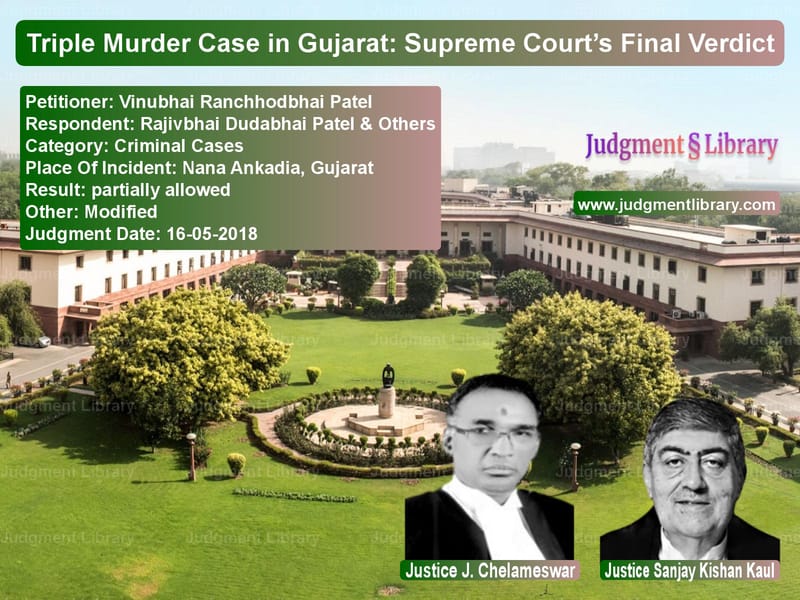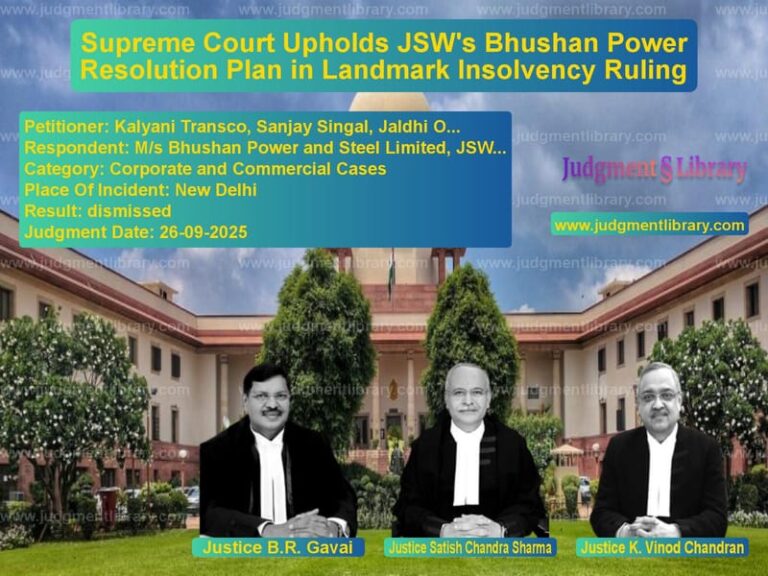Triple Murder Case in Gujarat: Supreme Court’s Final Verdict
The Supreme Court of India, on May 16, 2018, delivered a crucial judgment in Vinubhai Ranchhodbhai Patel vs. Rajivbhai Dudabhai Patel & Others. The case involved a violent attack in the village of Nana Ankadia, Gujarat, on July 11, 1992, which resulted in the death of three individuals and injuries to five others. The verdict highlighted multiple issues in the criminal justice system, including defective charge framing, inadequate judicial scrutiny, and the necessity of fair trials.
The Supreme Court reviewed convictions, acquittals, and prosecutorial failures in a case that spanned decades, ultimately delivering compensation to the victims due to procedural lapses and prolonged litigation.
Background of the Case
On July 11, 1992, at approximately 10:10 PM, a violent altercation erupted in Nana Ankadia, resulting in three deaths and multiple injuries. The police were alerted, and investigations led to the filing of charges against 15 accused, while two others remained absconding. The case was committed to the Sessions Court of Amreli due to the gravity of the offenses, including murder (Section 302 IPC) and unlawful assembly (Section 149 IPC).
The trial for the 15 accused resulted in the conviction of four individuals, while 11 were acquitted due to insufficient evidence. The two absconding accused were tried separately in 1998 and acquitted by the Fast Track Court in 2003. Appeals and revisions ensued, leading to the final adjudication by the Supreme Court.
Legal Questions Considered
- Did the charge framing comply with procedural law?
- Were convictions and acquittals legally justified?
- Did procedural lapses and prosecutorial failures affect the outcome?
- What relief, if any, should be provided to the victims?
Petitioner’s Arguments
The appellant, Vinubhai Ranchhodbhai Patel, contended:
- The conviction of some accused was inconsistent with the acquittal of others.
- The prosecution failed to present a coherent case against all accused.
- There were defects in framing charges, affecting the trial’s fairness.
- The trial court’s judgment lacked clarity in determining individual culpability.
Respondent’s Arguments
The respondents, including the State of Gujarat, argued:
- The Sessions Court had correctly evaluated evidence and found some accused not guilty.
- The acquittals were justified due to the prosecution’s failure to establish guilt beyond reasonable doubt.
- The conviction of the four accused was based on strong and credible witness testimony.
Supreme Court’s Observations
The Supreme Court found serious procedural deficiencies in the trial:
- Charges were not framed properly, making it unclear which accused were responsible for which deaths.
- There was no clear finding regarding the existence of an unlawful assembly.
- The trial court failed to analyze individual involvement in the crime.
- Some accused received injuries during the altercation, but this was not investigated properly.
The Supreme Court remarked:
“The cherished principle of proof beyond reasonable doubt should not be stretched to absurd limits. Acquitting the guilty leads to loss of public confidence in the justice system.”
Final Judgment
The Supreme Court, recognizing the severe procedural flaws and the prolonged duration of the case, refrained from ordering a retrial but directed compensation for the victims:
- The families of each deceased victim were awarded Rs. 25,00,000.
- The injured individuals, or their families, were awarded Rs. 10,00,000 each.
- The amount was to be deposited in the trial court within eight weeks.
The Supreme Court observed:
“When the State fails in its constitutional duty to maintain law and order and justice is delayed, it must compensate the victims.”
Key Takeaways from the Judgment
- The Supreme Court reaffirmed that failure in charge framing and judicial scrutiny can compromise justice.
- The ruling set a precedent for compensating victims in cases where justice is delayed.
- The judgment underscored the importance of a fair trial and proper investigation.
This case serves as a crucial reminder of the responsibilities of the judiciary and law enforcement in upholding justice while ensuring procedural fairness.
Petitioner Name: Vinubhai Ranchhodbhai Patel.Respondent Name: Rajivbhai Dudabhai Patel & Others.Judgment By: Justice J. Chelameswar, Justice Sanjay Kishan Kaul.Place Of Incident: Nana Ankadia, Gujarat.Judgment Date: 16-05-2018.
Don’t miss out on the full details! Download the complete judgment in PDF format below and gain valuable insights instantly!
Download Judgment: Vinubhai Ranchhodbha vs Rajivbhai Dudabhai P Supreme Court of India Judgment Dated 16-05-2018.pdf
Direct Downlaod Judgment: Direct downlaod this Judgment
See all petitions in Murder Cases
See all petitions in Bail and Anticipatory Bail
See all petitions in Custodial Deaths and Police Misconduct
See all petitions in Judgment by J. Chelameswar
See all petitions in Judgment by Sanjay Kishan Kaul
See all petitions in partially allowed
See all petitions in Modified
See all petitions in supreme court of India judgments May 2018
See all petitions in 2018 judgments
See all posts in Criminal Cases Category
See all allowed petitions in Criminal Cases Category
See all Dismissed petitions in Criminal Cases Category
See all partially allowed petitions in Criminal Cases Category







